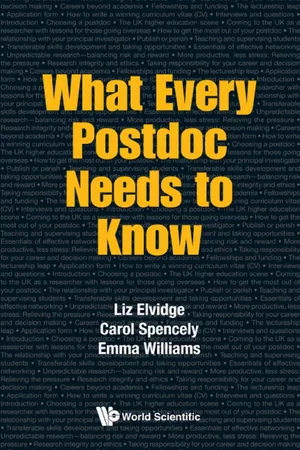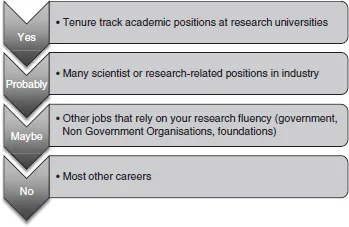
- 280 pages
- English
- ePUB (mobile friendly)
- Available on iOS & Android
What Every Postdoc Needs to Know
About this book
-->
Thinking of starting a postdoc? Want to know how to move on from a postdoc? Or simply want to make the best of your postdoc years? Being a postdoc is not a career... but it can be the pivotal point in the making of one. This friendly, practical, and occasionally humorous guide to all things postdoc combines the three authors?€? vast experience of postdoc careers and personal development.
This is a guide to developing, advancing and furthering yourself and your career. In working through exercises, learning from the experience of others (including the trials and tribulations of the authors), and seeking out information, we hope you will consider what success means on your own terms. In its pages you will find advice on:
-->
- Choosing the right postdoc for you
- Maximising your postdoc contract for personal and professional goals
- Selecting and attaining your next career step (academic or otherwise)
-->
Your postdoc is part of the journey towards a range of career destinations; from an industrial R&D specialist to politician, from lecturer to spin-out Chief Executive, and this book is designed to help you get there. Providing indispensable advice on UK-based postdocs for national and international students, it is perfect for those making exciting transitions (student to postdoc, postdoc to the wide world of careers beyond) or for those who simply want to take their postdoc up a gear.
-->
Request Inspection Copy
-->
Contents:
- Introduction
- Choosing a Postdoc
- The UK Higher Education Scene
- Coming to the UK as a Researcher — With Lessons for Those Going Overseas
- How to Get the Most Out of Your Postdoc
- The Relationship with Your Principal Investigator
- Publish and Prosper
- Teaching and Supervising
- Transferable Skills Development and Taking Opportunities
- Essentials of Effective Networking
- Unpredictable Research — Balancing Risk and Reward
- More Productivity, Less Stress: Relieving the Pressure
- Diversity in Research
- Research Integrity and Ethics
- Taking Responsibility for Your Career and Decision Making
- Careers Beyond Academia
- Fellowships
- The "Lectureship Leap" (Lectureships: What are They and How to Apply)
- How to Write a Winning Curriculum Vitae (CV)
- Interviews and Questions
- Conclusions: What Do We Hope You Know Now?
- Over to You
--> -->
Readership: National and international postdocs, student to postdoc, postdoc to a career, or for those who simply want to take their postdoc up a gear.
-->Postdoc;Research;Career Development;Advice;Early Career Researcher;Fellow;Fellowship;Academia;Researcher;Academic;Higher Education;Career Success Key Features:
- The author's have a collective wealth of experience working at major research intensive Universities and Institutes
- The material is presented as a workbook building in personal reflection and practical exercises
- It is the book about the UK academic world that everyone expects should have already been written, but never has
- It is down to earth and tells it like it really is — no fancy "development/trainer" language has knowingly been included
Tools to learn more effectively

Saving Books

Keyword Search

Annotating Text

Listen to it instead
Information








Table of contents
- Cover Page
- Title
- Copyright
- Foreword
- Acknowledgements
- Contents
- Introduction
- Chapter 1 Choosing a Postdoc
- Chapter 2 The UK Higher Education Scene
- Chapter 3 Coming to the UK as a Researcher — With Lessons for Those Going Overseas
- Chapter 4 How to get the Most out of Your Postdoc
- Chapter 5 The Relationship with Your Principal Investigator
- Chapter 6 Publish and Prosper Chapter
- Chapter 7 Teaching and Supervising
- Chapter 8 Transferable Skills Development and Taking Opportunities
- Chapter 9 Essentials of Effective Networking
- Chapter 10 Unpredictable Research — Balancing Risk and Reward
- Chapter 11 More Productivity, Less Stress: Relieving the Pressure
- Chapter 12 Diversity in Research
- Chapter 13 Research Integrity and Ethics
- Chapter 14 Taking Responsibility for Your Career and Decision Making
- Chapter 15 Careers Beyond Academia
- Chapter 16 Fellowships
- Chapter 17 The “Lectureship Leap” (Lectureships: What are They and How To Apply)
- Chapter 18 How to Write a Winning Curriculum Vitae (CV)
- Chapter 19 Interviews and Questions
- Chapter 20 Conclusions: What Do We Hope You Know Now?
- Chapter 21 Over to You
- Index
Frequently asked questions
- Essential is ideal for learners and professionals who enjoy exploring a wide range of subjects. Access the Essential Library with 800,000+ trusted titles and best-sellers across business, personal growth, and the humanities. Includes unlimited reading time and Standard Read Aloud voice.
- Complete: Perfect for advanced learners and researchers needing full, unrestricted access. Unlock 1.4M+ books across hundreds of subjects, including academic and specialized titles. The Complete Plan also includes advanced features like Premium Read Aloud and Research Assistant.
Please note we cannot support devices running on iOS 13 and Android 7 or earlier. Learn more about using the app